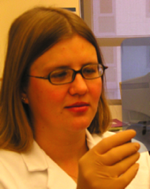
Education
| Ph.D. | Molecular Biomedicine | 2005 | University of Tartu, Estonia |
| M.Sc. | Biotechnology | 1999 | University of Tartu, Estonia |
Work History
| 2017-present: | Associate Specialist, Department of Pharmaceutical Chemistry, University of California, San Francisco |
| 2012-2017: | Assistant Specialist, Department of Pharmaceutical Chemistry, University of California, San Francisco |
| 2006-2012: | Postdoctoral Fellow, Department of Neurology, University of California, San Francisco |
Research Interests
I am fascinated by the complexity of circadian rhythms at the molecular level and I am interested in how deregulated sleep-wake cycles cause different disorders in humans using proteomics, metabolomics and glycomics approaches. I have discovered O-linked beta-N-acetylglucosamine (O-GlcNAc) as a novel post-translational modification in the circadian clock mechanism in mammals and Drosophila. I am interested how O-GlcNAcylation is coordinated with phosphorylation and with other post-translational modifications in regulating the speed of the circadian clock and metabolism. I am curious how the enzymes of O-GlcNAc signaling (OGT, OGA) are regulated with the daily rhythm and how altered OGT and OGA activity could be used for therapeutic benefit.
Select Publications
Kaasik K, Kivimae S, Allen JJ, Chalkley RJ, Huang Y, Baer K, Kissel H, Burlingame AL, Shokat KM, Ptáček LJ, Fu YH. Glucose Sensor O-GlcNAcylation Coordinates with Phosphorylation to Regulate Circadian Clock. Cell Metabolism (2012) [Accepted]
Costa MJ, So A, Kaasik K , Krueger K, Pillsbury ML, Fu YH, Ptacek LJ, Yamamoto KR, Feldman BJ. Circadian rhythm gene period 3 is an inhibitor of the adiopocyte cell fate. J Biol. Chem. 286(11)9063–70. (2011) [Pubmed]
Tamboom K, Kaasik K, Arsavskaja J, Tekkel M, Lilleorg A, Padrik P, Metspalu A, Veidebaum T. BRCA1 mutations in women with familial or early-onset breast cancer and BRCA2 mutations in familial cancer in Estonia. Hered Cancer Clin Pract. 8(1)4. (2010) [Pubmed]
Zhang J, Fang Z, Jud C, Vansteensel MJ, Kaasik K, Lee CC, Albrecht U, Tamanini F, Meijer JH, Oostra BA, Nelson DL. Fragile X-related proteins regulate mammalian circadian behavioral rhythms. Am J Hum Genet.83(1) 43–52. (2008) [Pubmed]
Zhang J, Kaasik K, Blackburn MR, Lee CC. Constant darkness is a circadian metabolic signal in mammals. Nature. 439(7074) 340–3. (2006) [Pubmed]
Kaasik K and Lee CC. Reciprocal regulation of haem biosynthesis and the circadian clock in mammals. Nature 430(6998) 467–71. (2004) [Pubmed]
Walz K, Spencer C, Kaasik K, Lee CC, Lupski JR, Paylor R. Behavioral characterization of mouse models for Smith-Magenis syndrome and dup(17)(p11.2p11.2). Hum Mol Genet. 13(4) 367–78. (2004) [Pubmed]
Greenfield JP, Leung LW, Cai D, Kaasik K, Gross RS, Rodriguez-Boulan E, Greengard P, Xu H. Estrogen lowers Alzheimer beta-amyloid generation by stimulating trans-Golgi network vesicle biogenesis. J Biol Chem. 277 (14) 12128–36. (2002) [Pubmed]
Zheng B, Albrecht U, Kaasik K, Sage M, Lu W, Vaishnav S, Li Q, Sun ZS, Eichele G, Bradley A, Lee CC. Nonredundant roles of the mPer1 and mPer2 genes in the mammalian circadian clock. Cell. 105(5) 683–94. (2001) [Pubmed]
Teder M, Klaassen T, Oitmaa E, Kaasik K, Metspalu A. Distribution of CFTR gene mutations in cystic fibrosis patients from Estonia. J Med Genet. 37(8) E16. (2000) [Pubmed]
Tonisson N, Kurg A, Kaasik K, Lohmussaar E, Metspalu A. Unravelling genetic data by arrayed primer extension. Clin Chem Lab Med. 38(2) 165–70. (2000) [Pubmed]


